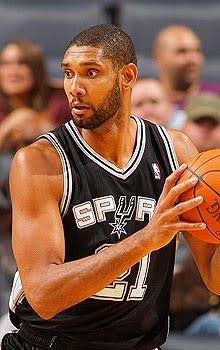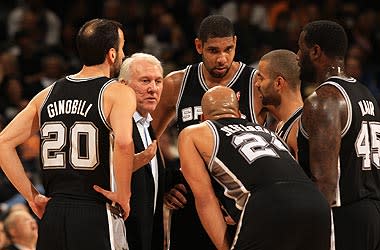Spurs band together for another run
Tim Duncan(notes) smiles as he surveys the shifting NBA landscape. "New age," he says, and if it sounds like he isn't quite sure where he stands after all this tectonic movement, that South Texas clay beneath his feet seems as stable as ever.
He'd spent the summer like everyone else, watching and wondering what it all meant. LeBron James(notes) and Chris Bosh(notes) joined Dwyane Wade(notes) in Miami. Amar'e Stoudemire(notes) signed a $100 million contract with the Knicks. Carlos Boozer(notes) left Utah for Chicago. Chris Paul(notes) and Carmelo Anthony(notes) even toasted their dream union.
"To each their own," Duncan says, and he's still smiling.
"Sometimes you take an easier route. But the easier route isn't always guaranteed anything."
Duncan won't pass judgment, but perspective. There'd been a time when he, too, considered leaving the only NBA team he'd ever played for. He stayed, and the decision delivered three more titles. Continuity worked for him. Some 10 years later, it apparently still counts for something.
Twenty victories and three losses into their season, the San Antonio Spurs own the NBA's best record and the franchise's greatest start ever. To anyone who had seen them a year ago – most of all themselves – this comes as some surprise. Then, they limped through the season's first three months, preparing for a turbulent summer that threatened to scatter them. Manu Ginobili(notes) questioned whether he would return, and he was right to do so: The Spurs were wondering whether they should bring him back. Tony Parker(notes) was slowed by a foot injury and, at times, looked disinterested enough that the Spurs debated whether to trade him, going so far as to inquire about Paul's availability.
Together with Duncan, they had made a nice run, sharing ownership of the previous decade with the Los Angeles Lakers. Maybe it was time to start something new.
Or not.
As much of the NBA genuflected before James and his free-agent friends, the Spurs took a long look at themselves and figured they could stand to live with each other for another few years. If they were going to go down, they might as well do it together.
"We decided we're better off sticking with who we have," coach Gregg Popovich said, "rather than change things."
Today, the Spurs look a little more healthy and engaged. They play faster and their bench is considerably longer. Their black-and-silver core, however, remains unchanged: Duncan-Ginobili-Parker-Popovich. In an era when the NBA feels compelled to fine players who publicly ask for a trade (because too many of them would if they could), the Spurs have stayed together.
That wouldn't have been possible if Duncan had joined Grant Hill(notes) in signing with the Orlando Magic. Or if Ginobili hadn't put off his own free agency and a chance at greater riches to sign a three-year, $39 million extension in April. Or if Parker hadn't convinced the Spurs – content to push their point guard into the uncertainty of a new collective bargaining agreement – that he was committed to staying in San Antonio. Parker backed up his pledge by signing a four-year, $50 million extension that becomes even more reasonable with a final season that guarantees him only about $3 million.
Nor would it have been possible had the men who brought them all together not decided to stick along for the ride. Popovich has long joked that he plans to retire about 30 seconds after Duncan plays his final game, and his contract allowed him to do that: Like that of Duncan, it was set to expire after next season. Parker and Ginobili, understandably, wanted assurances their coach would wait another few years to tend to his vineyard.
"I kind of feel I have to commit to those guys," Popovich said.
So he did. Though the addendum to Popovich's contract might not be formally completed, it's close to a formality to those within the organization. Even as the team struggled last season, Spurs owner Peter Holt made clear he wanted Popovich to stay on the sideline during the inevitable transition.
"He suggested that maybe he could have some kind of consulting role," Holt said. "I told him I didn't need a consultant; I need a coach."
Popovich could eventually move back into the front office full time, or even take a leave from coaching for a year or two. But none of that is expected to happen until after Ginobili's contract is completed, if it happens at all. R.C. Buford, the Spurs' general manager, also isn't going anywhere anytime soon. He received a new contract during the summer, shortly after the New Jersey Nets showed interest in hiring him to replace Rod Thorn.
The Spurs have clung to Popovich's pound-the-rock mantra for 15 seasons now, and it's a big reason why continuity – "corporate knowledge," as Popovich calls it – is so valued within their roster. Even after Richard Jefferson's(notes) forgettable first season as a Spur, Popovich spent part of the summer helping "retool" him – then gave Jefferson a four-year contract.
"He loves pushing people and making teams better," Duncan said. "That's what he does best."
After the Phoenix Suns swept the Spurs in last season's Western Conference semifinals, Popovich had one request for his roster: "I wanted a [bleeping] bench." The Spurs already had a couple of young players in George Hill(notes) and DeJuan Blair(notes) in their rotation, and they added three more: rookies Tiago Splitter(notes), James Anderson(notes) and Gary Neal(notes), an undrafted free agent with a few years of European ball on his résumé. With Hill playing like a Sixth Man of the Year candidate of late, the Spurs' bench looks as deep as it has in years. So much so that Duncan is averaging fewer than 29 minutes a game, by far the fewest of his career.
The Spurs have moved their offense out of Duncan's hands and into those of Ginobili and Parker, a change that has contributed to a drop in Duncan's production. In three straight runaway victories, he didn't leave his seat in the fourth quarter. The streak would have stretched to four had Duncan not checked himself into a victory over the Portland Trail Blazers. Duncan laughed it off afterward, but he's stone serious about this: He wants to play. Given the opportunity on some nights, he can still rank as one of the game's best big men – offering a triple-double against the Golden State Warriors as evidence. Popovich's challenge is to get Duncan enough minutes, mindful he also needs him healthy for the playoffs.
Duncan turns 35 in April and has one year left on his contract, which could be swallowed by a possible lockout. Spurs officials can envision him continuing to play on a short-term deal, and Duncan said he'd be willing to commit to another five seasons if he could guarantee his troublesome left knee will continue to hold up. But he can't.
"I would love to play until the wheels come off, but that's not how it goes," he said. "I want to play at a high level and I want to be able to play well. If that's not the case, then it might be better for me to walk away."
Duncan is in no rush to make that decision. A lot can change in a year. LeBron is now winning in Miami. Stoudemire has revitalized the Knicks.
Duncan can smile. After all this time, he still has Parker on one side and Ginobili on the other. Nearly a week before Christmas, and the Spurs are looking down on the NBA.
New age?
Or same old one?



